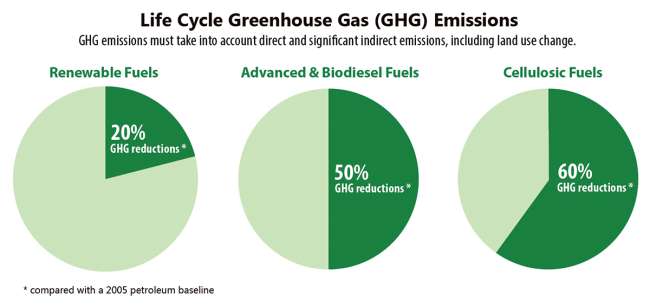Senior Reporter
EPA Proposes Lower Minimum Volume Requirement for Renewable Fuels in 2018

The U.S. Environmental Protection Agency has proposed cutting back on the minimum required volume of renewable fuels produced in 2018 and putting the brakes on the minimum volume of biomass-based diesel produced in the United States in 2019.
The proposal marks the Trump administration’s first policy direction on renewable fuels.
In a related development, a bipartisan bill has been introduced in Congress that would over the next five years reduce, and eventually eliminate, a biodiesel tax credit incentive, legislation supported by American Trucking Associations and several other trade associations.
The renewable fuel standard proposal, which will be the subject of an Aug. 1 EPA public hearing in Washington, drew critical comments from biodiesel producers and soybean farmers.
“The EPA should be committed to diversifying the diesel fuel market and prioritizing advanced biofuels,” Anne Steckel, vice president of federal affairs at the National Biodiesel Board, said in a recent statement. “Targets like this ignore reality and the law, inhibiting growth in the industry.
This is only a proposal, and, in the past, the EPA’s final numbers have been higher than those in the proposal. We will continue to work with the EPA and ensure the administration doesn’t turn its back on our domestic energy producers.”
The American Soybean Association said in a recent statement: “To have the levels proposed be no higher than called for in 2018 and less than what is being utilized in 2016 is disappointing and would miss an opportunity to utilize surplus soybean oil to diversify our fuel supply and boost jobs, particularly in rural America.”
John Whittington, co-owner of Integrity Biofuels in Morristown, Ind., said, “It sends a bad message to the players in the industry about the future longevity of the business.”
Whittington said the biodiesel industry is producing a higher-quality biofuel than it did 10 years ago, and truckers have increasingly been using the fuel.
The EPA proposal would maintain the minimum required biomass-based diesel volumes at 2.1 billion gallons for 2019, but in 2018 set the advanced biofuels based on a minimum applicable volume of 4.24 billion gallons, a decrease from 4.28 billion gallons in 2017.
The biomass-based diesel requirements are set one year ahead of the other renewable fuels, which are being proposed for 2018.
Overall, the production level of renewable fuel minimum would drop to 19.24 billion gallons in 2018 from 19.28 in 2017.
“EPA should set the advanced biofuel requirements for 2018 based on a volume of at least 5.25 billion gallons and the biomass-based diesel volume for 2019 at 2.75 billion gallons,” the biodiesel board said.
But EPA said July 18 in its formal notice of proposed rulemaking that it made the decision to use its cellulosic waiver authority “after careful review” but that it will nonetheless “ensure these renewable fuels will continue to play a critical role as a complement to our petroleum-based fuels.”
“We note that while we are proposing to reduce the required volume of all of the fuel categories other than biomass-based diesel due to an anticipated shortfall in the production of cellulosic biofuel, the proposed biomass-based diesel volume exceeds the statutory minimum and the proposed volumes of total renewable fuel, advanced biofuel and cellulosic biofuel would achieve the implied statutory volumes for conventional biofuel3 and noncellulosic advanced biofuel,” the agency said.
All biofuels are made from plant material. The main biofuel on the U.S. market is corn ethanol, made using the starch in corn grain. Cellulosic sources of biofuels include leaves, stems and other fibrous parts of a plant.
For any calendar year for which the projected volume of cellulosic biofuel production is less than the applicable volume of cellulosic biofuel set forth in the Clean Air Act, EPA must reduce the required volume of cellulosic biofuel for that year to the projected volume and must provide the opportunity to purchase cellulosic waiver credits at a price determined using a formula specified in the Clean Air Act.
The renewable fuel standard, intended to move the United States toward greater energy independence and security and increasing the production of clean renewable fuels, has been in effect since 2006.
Today, nearly all of the approximately 143 billion gallons of gasoline used for transportation purposes contains 10% ethanol, and, on average, diesel fuel contains about 4% biodiesel and/or renewable diesel, the agency said.
“Entities potentially affected by this proposed rule are those involved with the production, distribution and sale of transportation fuels, including gasoline and diesel fuel or renewable fuels such as ethanol, biodiesel, renewable diesel, and biogas,” the proposal said.
Glen Kedzie, ATA’s vice president of environmental affairs, said the proposal has created “a lot of unhappy campers” in the biodiesel industry, some who fear that President Donald Trump’s EPA is moving away from renewable fuels.
“But these aren’t earth-shattering levels,” Kedzie said. “I don’t think it’s a clear indicator that the administration is trying to get rid of renewable fuels.”




